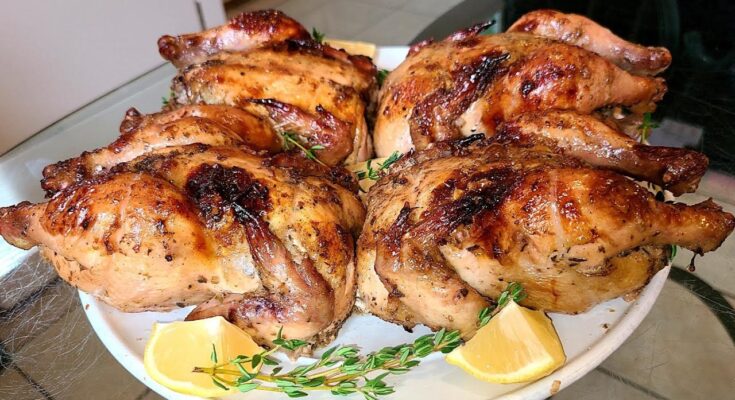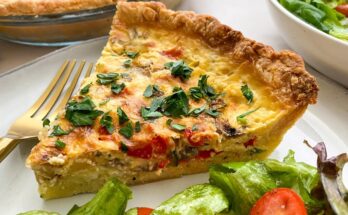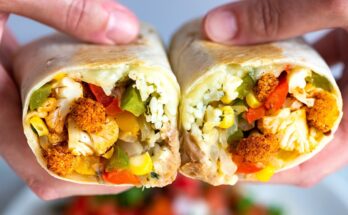Cornish Hen Recipe: Cornish hens are the perfect choice when you’re craving a gourmet meal that’s easy to prepare. Smaller than regular chickens, these tender birds are packed with flavor and cook much faster.
Whether you’re preparing a holiday feast or a weeknight dinner, Cornish hens are a delightful and elegant option.
Benefits of Cooking Cornish Hen
One of the reasons Cornish hens are so popular is their versatility. These small birds offer the perfect portion size, making them ideal for individual servings. They cook quickly compared to larger poultry, and their meat absorbs marinades and spices exceptionally well, giving you a burst of flavor in every bite. Plus, their presentation on the plate is impressive enough to wow your guests.
Ingredients Needed
Main Ingredients:
- 2 Cornish hens (about 1 to 1.5 lbs each)
Seasoning Essentials:
- 2 tbsp olive oil
- 1 tsp salt
- 1 tsp black pepper
- 1 tsp garlic powder
- 1 tsp onion powder
- 1 tsp smoked paprika
- 1 tbsp fresh rosemary (chopped)
- 1 tbsp fresh thyme (chopped)
Optional Ingredients for Customization:
- Lemon slices
- 2 tbsp butter
- Honey or maple syrup (for a glaze)
- Vegetables (carrots, onions, potatoes) for roasting
Tools and Equipment
To achieve the best results, gather the following:
- Roasting pan
- Meat thermometer
- Kitchen scissors
- Basting brush
- Mixing bowl
- Aluminum foil
Optional tools like a trussing string or an air fryer can make the process even smoother, depending on your chosen cooking method.
Preparing the Cornish Hens
Start by thoroughly cleaning the Cornish hens. Rinse them under cold water and pat dry with paper towels. Trim any excess fat or skin. If desired, you can also remove the wingtips to prevent burning during cooking. Once cleaned, lightly rub olive oil all over the hens to help the seasoning adhere better.
Making the Marinade
A flavorful marinade is key to tender and juicy Cornish hens. In a mixing bowl, combine olive oil, salt, pepper, garlic powder, onion powder, smoked paprika, rosemary, and thyme. Mix well to create a paste. Massage this marinade generously over and inside the hens. For best results, let the hens marinate in the refrigerator for at least 2 hours or overnight.
Stuffing Options for Cornish Hens
Stuffing your Cornish hens elevates their flavor to a new level. Some classic stuffing ingredients include a mix of breadcrumbs, chopped onions, celery, and herbs. Alternatively, you can try wild rice, cranberries, or apple slices for a more creative twist. Ensure not to overstuff the hens, as it can impact the cooking time and lead to uneven results.
Cooking Methods
Roasting in the Oven
Roasting is the most common way to cook Cornish hens, giving them a crispy exterior and tender interior. Preheat your oven to 375°F (190°C). Place the hens breast-side up in a roasting pan, ensuring there’s enough space around them for even cooking. For an extra layer of flavor, surround the hens with your choice of vegetables like carrots, onions, or potatoes.
Grilling Techniques
Grilling adds a smoky, charred flavor to your Cornish hens. Preheat your grill to medium heat (about 350°F to 400°F). Use indirect heat to prevent burning the exterior while ensuring the interior cooks through. Place the hens on the grill and cover, turning them occasionally for even cooking. A meat thermometer is especially handy here to check for doneness.
Air Fryer Preparation
The air fryer is a quick and efficient option for cooking Cornish hens. Preheat the air fryer to 375°F. Place the hens inside, breast-side down, and cook for 15 minutes. Flip them over and continue cooking for another 15–20 minutes, checking periodically to avoid overcooking. The result is a perfectly crisp skin with juicy meat inside.
Step-by-Step Cooking Instructions
- Preheat the Oven: Preheat your oven to 375°F (190°C). Ensure the rack is placed in the center of the oven for even heat distribution.
- Prepare the Hens: Remove the hens from the refrigerator about 20 minutes before cooking to bring them to room temperature. Place them on a roasting rack inside a pan.
- Add Stuffing: If you’ve prepared stuffing, gently fill the cavity of each hen. Avoid packing it too tightly to allow heat to circulate properly.
- Roast the Hens: Brush the hens with a little more olive oil or melted butter. Place the roasting pan in the oven and cook for approximately 50–60 minutes.
- Monitor Cooking: Halfway through, baste the hens with the juices in the pan to keep the meat moist.
- Check for Doneness: Use a meat thermometer inserted into the thickest part of the thigh (avoiding the bone). The internal temperature should read 165°F (74°C).
- Rest Before Serving: Remove the hens from the oven and let them rest for 10 minutes. This allows the juices to redistribute, ensuring moist and flavorful meat.
Basting the Cornish Hens
Basting is essential for keeping the hens juicy and flavorful. Every 15–20 minutes during cooking, spoon the juices from the bottom of the pan over the hens. If you’re aiming for a golden-brown glaze, mix a bit of honey or maple syrup into the basting liquid during the last 10 minutes of cooking.
Checking for Doneness
A meat thermometer is your best friend when cooking Cornish hens. Insert it into the thickest part of the thigh, avoiding the bone. The internal temperature should reach 165°F (74°C). If you don’t have a thermometer, look for clear juices when piercing the thigh. Pink or cloudy juices mean the meat needs more time.
Serving Suggestions
Cornish hens pair wonderfully with a variety of side dishes. Here are some ideas to round out your meal:
- Roasted Vegetables: Carrots, parsnips, and brussels sprouts roasted in olive oil and garlic complement the flavors beautifully.
- Mashed Potatoes: Creamy mashed potatoes are a classic choice.
- Wild Rice Pilaf: Adds a nutty and earthy flavor to the meal.
- Fresh Salad: A light and crisp salad with a tangy vinaigrette balances the richness of the hens.
For presentation, consider placing each hen on a bed of vegetables or garnishing with fresh herbs and lemon wedges.
Common Mistakes to Avoid
- Overcooking or Undercooking: Always use a thermometer to ensure perfect doneness.
- Skipping the Resting Period: Resting is crucial for retaining juices and ensuring tender meat.
- Neglecting Basting: Regular basting prevents the meat from drying out, especially during roasting.
- Overstuffing the Hens: Overfilled hens may cook unevenly, leading to underdone stuffing or dry meat.
Storage and Reheating Tips
If you have leftovers, store them in an airtight container in the refrigerator for up to 3 days. To reheat:
- Oven: Preheat to 350°F. Cover the hens with aluminum foil to retain moisture and heat for 15–20 minutes.
- Microwave: Use a microwave-safe plate, cover with a damp paper towel, and heat in 1-minute intervals until warm.
- Air Fryer: Reheat for 5–7 minutes at 375°F for a crispy texture.
FAQs about Cornish Hen Recipe
1. What is a Cornish Hen?
A Cornish hen, also known as a Cornish game hen, is a small breed of chicken, typically weighing around 1-2 pounds. Its size makes it perfect for individual servings or elegant dinner presentations.
2. How do you prepare Cornish hens?
Preparing Cornish hens is simple! Clean and pat them dry, then season with your favorite spices or marinades. Roast, grill, or air-fry them to achieve a tender and flavorful dish.
3. What temperature should Cornish hens be cooked to?
Cornish hens should reach an internal temperature of 165°F (74°C) in the thickest part of the meat. Use a meat thermometer to ensure they are cooked safely and thoroughly.
4. Can I stuff a Cornish hen?
Yes, you can stuff a Cornish hen with ingredients like herbs, rice, or vegetables. Just make sure the stuffing also reaches an internal temperature of 165°F to avoid undercooking.
5. How long does it take to cook Cornish hens?
Cooking time depends on the method used. Generally, roasting in the oven at 375°F (190°C) takes about 45-60 minutes. For quicker cooking, try using an air fryer.
6. What side dishes pair well with Cornish hens?
Cornish hens go well with a variety of sides, such as mashed potatoes, roasted vegetables, or a fresh garden salad. For a gourmet touch, pair them with wild rice or cranberry sauce.
7. Are Cornish hens healthier than regular chicken?
Cornish hens are similar to regular chicken in terms of nutrition but offer smaller portions, making them ideal for controlled servings. They are also lean and low in fat when cooked without heavy oils.
Conclusion
Cooking Cornish hens may seem like a fancy affair, but it’s surprisingly simple with this step-by-step guide. From preparation to presentation, these tender and flavorful birds make any meal special. So why not give it a try? With the tips and techniques outlined here, you’re sure to create a dish that’s both delicious and unforgettable.



